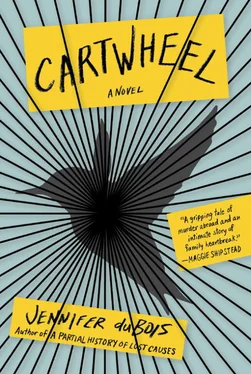But an hour before the appointed time, Sebastien saw that his luck had run out: The house would never, never do. Suddenly he could see how odd and empty it looked; how loneliness seemed to clutter around the corners of the rooms, how desperation was a thing you could almost smell. The house was a monstrosity. The house was a horror. And Lily Hayes, he’d realized with startling and growing anguish, was going to see it in an hour.
He was going to have to torch the place, he’d decided. He was going to have to make it look like arson. But no, no. He’d looked at the clock sorrowfully. He had no time for that. Instead, he was going to have to try to clean it. Sebastien never really cleaned in earnest (though neither did he engage in the activities that necessitated the most cleaning—cooking, child rearing, hosting other human beings). Nevertheless, he’d spent an anxious and sickening twenty minutes making ill-advised attempts at tidying. He’d swiped limply at the tables and mantel; he’d found some candles in a cupboard in the kitchen. Lighting them, he’d hoped, would make the place look romantic and European—tragic in the way of widowers and heirs to mysterious fortunes, and not in the way of serial killers or animal hoarders or the mentally touched. He’d wasted a quarter of an hour considering the picture of the felled tapir. His parents had put up the picture—maybe, he thought now, because he and his father looked so very much alike in it—and Sebastien had never really thought about what having it on display might say about his character (to whom? being the salient question, of course). But suddenly Sebastien saw that a stranger would think he’d selected the photo with solemn care—as the representative image of his time with his parents (bad) or else the proudest triumph of his short and underwhelming life (worse). He’d considered hiding it, but he worried about the time, as well as what unspeakable horrors he might find behind the picture if he moved it. Instead, he’d reached behind the grandfather clock and dislodged a nest of dark gray dust. He did not know why he was doing this; he did not think Lily was likely to inspect behind the clock. Perhaps he had seen the overarching futility of the project and was willfully undermining himself. It wouldn’t be the first time, he’d thought, as he went to light the candles.
She’d shown up right on time, dressed in some kind of straightforward floral getup that was exactly the outfit Sebastien himself would have picked if he’d been told to dress up as an American girl for a costume party. In the frantic cleaning, Sebastien had forgotten that he’d planned to elaborately hand Lily an already poured glass of wine; instead, he’d had to grab the first glass that was handy, which turned out, horribly, to have SORBONNE 1967 etched into it. It wasn’t long after that that Lily had accused Sebastien of being boring. This was not an assessment that Sebastien necessarily disagreed with; nevertheless, he’d felt that the best approach was to treat it as an accusation so ludicrous that he could react only with benign and divested curiosity—which meant, of course, that he’d wound up sounding more boring still. To keep himself from talking, Sebastien had then kissed Lily. It had been a long time since he’d kissed anyone—years, in fact: long enough for him to have nearly forgotten the strange alchemy that brought one pair of lips to another. But in the moment, he wasn’t thinking of that; he was thinking only of the endless and undeniable whorls of Lily’s mouth. She had the most utterly perfect mouth he had ever encountered, of that he was sure; an entire planetarium moved through his head as they kissed. When he pulled back, however, he saw that it had not been the same for her; he saw that she had been oblivious—and this, childishly, had made him want to be cruel in a way that would make him seem oblivious, too. He’d groped madly for some kind of blunt object and landed on a remark about Katy’s attractiveness, which had prompted Lily to observe that Katy was “insipid,” which had led Sebastien to reflexively counterobserve that he’d thought she and Katy were friends. In fact, he’d had no opinion on the matter—surely modern relations weren’t mapped by such metrics?—and he’d been sure that Lily would see how desperate this was. Instead, she’d seemed to take the question seriously; her face darkened, and Sebastien could see the lengthening shadows of New England guilt, the heartrending consideration of the most middle-class of values and virtues. “My friend,” she’d said. “Well, sure.”
Sebastien had kissed her again then. “You’re a wicked woman,” he’d said. He did not mean it. He did not mean anything, ever, and especially, maybe, he did not mean this.
He had not expected to see her again after that. And yet, mirabile dictu , she had texted the next day, and come back again a day after that, and now he’d seen her a half dozen times, perhaps, in ten nights. That morning, for the first time, she had actually called him.
“Do you know who this is?” she’d said. She had a certain quality to her voice—it was a bit raspy, a bit out of breath—that made her always sound like she’d just come from doing something wholesome and outdoorsy.
“I know who I hope it is,” he’d said.
“It’s not Beatriz Carrizo.”
“Hélas.”
“What are you doing tonight?”
Sebastien swallowed. “It so happens that my schedule just cleared.”
And now, racing up and down the aisles of Pan y Vino, Sebastien felt a sense of quickening, enlivening. He should not, he knew, be allowing himself to get quite so worked up about things. He should not be thinking of his and Lily’s as some kind of world-historical romance; it was not, he realized, even a terribly original one. The evenings they had spent together so far had all been the same: French kissing, Italian cinema, talk of the most sophomoric and navel-gazing variety before retiring to the bed to paw at each other up to a point of stasis. Sebastien wasn’t sure of Lily’s history in this realm, though it was a pretty safe bet that she was overestimating his own. The bulk of Sebastien’s sexual experience came from one drunken evening with an anorexic premed during his Harvard accepted students’ weekend; her arms had been covered in silken hair, and their union had been perfunctory and un-memorable. Despite this early adventure, the years of solitude since had contributed to a sense of renewed virginity. Sex belonged to the world, to the living, if anything did, and Sebastien never felt this more acutely than on his nights in bed with Lily, when matters escalated to a certain pitch and then some decision—not discussed, and not mutual—was made, and she rolled over and thrust the cupola of her ass into his thighs and Sebastien, mute with cathectic longing, abandoned her to her even breathing and faraway thoughts.
And yet in a fundamental way it seemed to Sebastien that Lily had dragged him, just a little, back into the world with her. Isolation and proximity to mortality had made his life feel oddly timeless; it stretched out before him, flat and featureless as the African savannah. But tonight Lily was coming over, and Sebastien had to buy these things now to have them ready. There was a satisfying urgency to this—even if it was, as he realized, truly the most basic contour of a typical life. Tonight, he would try to find a tablecloth. He would bring up one of the better wines from the cellar. And he would also, he’d decided, try to give Lily a bracelet.
Sebastien was not sure how this was going to go. He did not want it to seem grasping or desperate or, far more devastatingly, like some sort of bribe. And yet he had so many things he could not use, so many things he would very much like to give to her. He had spent the afternoon going through his mother’s jewelry—touching her emerald brooch, holding her sapphire necklace up to the light and letting it splash cerulean on the floor. He tried to imagine the parties where she must have worn these things. As a child, Sebastien had been patient with his questions, certain that all the answers would someday be forthcoming. And now he was grown up, and he looked back and found all the questions right there where he’d left them: gathering dust, perhaps, but remarkably well preserved. The questions were more durable than anything, really—the questions and the objects. Everything else trended toward annihilation. Sitting on the floor, Sebastien had fingered his mother’s diamond bracelet; the opal ring that she’d always been superstitious about wearing, though he’d never known why. He imagined all of them transformed by proximity to Lily, and to life.
Читать дальше












